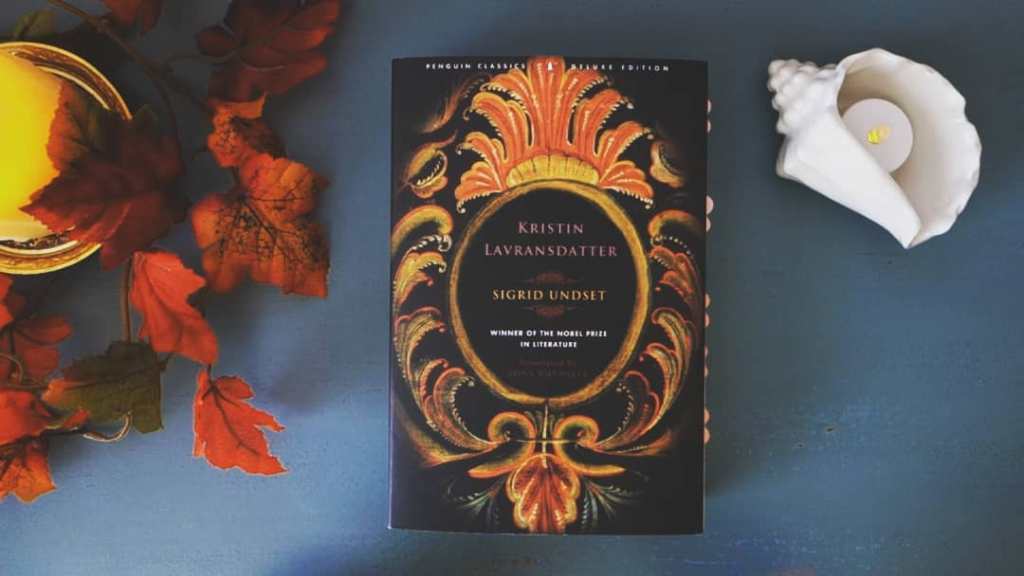
I am nearly halfway through the Kristin Lavransdatter trilogy, currently reading Book 2, The Wife. This recounts the early years of Kristin’s marriage, including the fallout from Book 1. To say any more about the plot would be spoilers, so I’ll stop there.
So far, this book is proving to be far more satisfactory than the first one. I felt The Wreath (Book 1) was a bit too melodramatic, bordering on romance genre. The Wife brings the story down to earth, and we get to see the consequences of the characters’ earlier decisions. While I wouldn’t go so far as to say it’s resolved all of my peeves about Book 1, it’s nonetheless a compelling, thought-provoking novel. I’ve found at least one new character I care about, which, if you know me, is critical for wanting to continue reading. 😉
Kristin has also added dimension to my musings on traditional vs. modern life, changing social structures, and all the topics that have lately reentered cultural conversation.
For example, it seems more and more millennials (and some Gen Zs) yearn for agricultural life and “going off grid,” due to the Fourth Industrial Revolution and other current dilemmas. Who can argue with that, when jobs are growing increasingly competitive and automated? There is something seemingly idyllic about a medieval religious farming community, like something from a fantasy world (in effect, it is, given how far we are from 14th-century life). Being close to like-minded people, using nature and not abusing it, working with your hands instead of at a desk… this is all highly appealing.
Yet while reading Kristin—which was published in the 1920s, well before the consumer computer age—I’m reminded every lifestyle has its tradeoffs. Owning land, farming, and maintaining an orderly community meant you could not simply do what you want. If anything, the collective was stronger in a society, because you just couldn’t up and move to somewhere else if you didn’t like the local church or your immediate neighbors. Or if you did move, it would come at quite a cost. Thus it was pragmatic to put down roots, marry your children off strategically, and follow strict rules of morality (i.e. the Church) to ensure the legitimacy of your claims on the land, which was your whole livelihood. In this trilogy, we see two men who live their lives in different ways, Lavrans and Erlend, and how everything from mistakes to negligence to outright selfishness can impact their entire life and standing.
Personally, I think it is debatable whether such a lifestyle, updated to the 21st century, is better for the whole. More of a pertinent question would be whether it is widely attainable, beyond an isolated commune or two.
My sense is that while land-based living may be feasible, especially with modern infrastructure and the social safety net, society’s troubles will go on overhead. Fast consumerism is a powerful beast that preys on short-term gratification, which everyone is susceptible to at some level. The majority, then, are unlikely to abandon it. For those inclined towards farming, I see it as a positive in the immediate future, but neutral or possibly negative long-term. Unless you can buy yourself an independent island or something truly autonomous, eventually the modern world will find a way to pull you in again or, worst-case scenario, take what you have away by brute force. Then you’d have nothing, and you don’t want to become someone with nothing to lose.
The thing which is always useful in either context is sheer skill. Viktor Frankl, in his memoir Man’s Search for Meaning, wrote of how he was consulted as a psychotherapist by one of his guards at the concentration camp. This skill, seemingly irrelevant in such awful conditions, earned him the gratitude of the guard and more favorable treatment. They could take everything away from him, except his knowledge. It shows knowledge is crucial for survival, even knowledge some would scoff at—therapy, philosophy, music, and all the things that have to do with human emotions.
In the world of Kristin Lavransdatter, life is not as simple as it appears on the surface. All the same complexities of human nature we face today still exist, brought to light in relationships, hardships, and injustices on a miniature scale. Whatever outward changes a person makes in their physical circumstances, their inner life will make or break its success and determine whether it brings them fulfillment.

Leave a comment